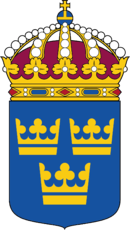Sami Parliament of Sweden
The Sami Parliament of Sweden (Sametinget in Swedish and Sámediggi in Northern Sami) is the representative body for people of Sami heritage in Sweden. It acts as an institution of cultural autonomy for the indigenous Sami people.
 |
| This article is part of a series on the politics and government of Sweden |
|
| Foreign relations |
|
Related topics |
History
The Sami Parliament Act, Sametingslag (1992:1433), established the Swedish Sami Parliament as of 1 January 1993. By law, the first official elections were held on 16 May 1993. Its first session was opened by the King of Sweden, Carl XVI Gustaf, on 26 August 1993 in Kiruna. It has 31 representatives, who are elected every four years by general vote. The current Chairperson of the Sami Parliament is Stefan Mikaelsson since 2009. The chairperson is formally assigned by the Swedish Government upon the proposal of the Sami Parliament.
Responsibilities
Sweden has taken this active part for two reasons:
- to recognise the Sami minority as an indigenous people to distinguish it from other minorities;
- to raise the Sami minority influence which comes into conflict with the European majority democracy system, i.e., the group with the most votes wins.
Voting system
Sami Parliaments are democratically elected and act as autonomous authorities. In each country, Sami inhabitants have a vote, in addition to the regular elections in each country, to elect representatives to their Sami Parliament if:
- they consider themself to be culturally or ethnically Sami, and
- they speak a Sami language, or
- they have had or have a parent, or grandparent, that speaks or spoke a Sami language
See also
- List of Chairpersons of the Sami Parliament of Sweden
- Sámi politics
- Sami Parliament of Finland
- Sami Parliament of Norway
- Sami Parliament of Russia